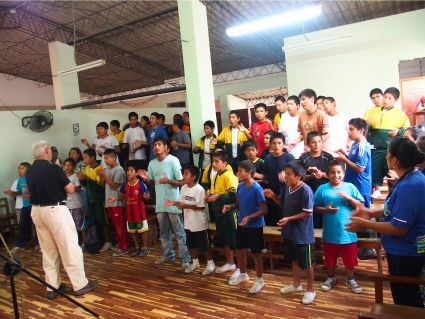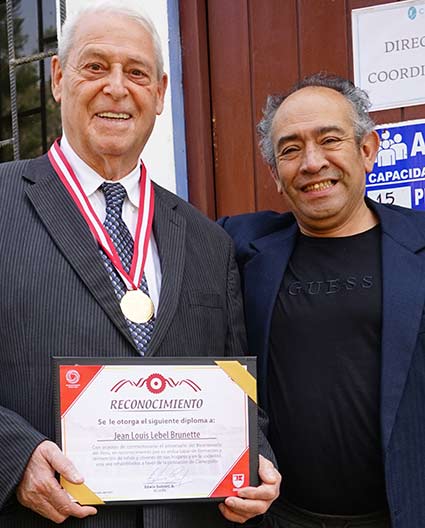The guiding principles are as follows:
- The child’s best interest prevails above all. The children and adolescents at CIMA need rehabilitation; in other words, they need help to overcome certain personal difficulties. The program is designed to support them in their physical, intellectual, emotional, psychological, and social development.
- The child is not an object; they are a human being with rights. The children and adolescents are respected as individuals and are entitled to all their rights.
- The program is based on a Christian humanist foundation that upholds the values of the Gospel. The children and adolescents receive a Christian education. The CIMA team strives to live out the values of the Gospel, ensuring that the adults who work there reflect these values both in their personal lives and in their interactions with the children.

- Unconditional and profound love for all is essential. Love is not dependent on behavior. A child or adolescent is never expelled for misbehavior. Many have been rejected by schools, shelters, or even their own families. We cannot continue to repeat these rejection scenarios, as this would perpetuate the failures that have damaged the self-esteem of the children and adolescents.
- CIMA fosters relationships with families but does not replace the family. CIMA aims to be a warm and welcoming home, but the staff is aware that they can never fully replace the family. The goal of CIMA is to strengthen family ties to enable the long-term reintegration of the child or adolescent into their family.
- The child is the main actor in the program, embedded in a group of which they are an active part. The child belongs to a group of up to 16 peers per house. Interaction among them is of paramount importance. The aim is to break away from the model that limits interaction to that between an adult and a group of children. Each child is responsible for the well-being of the group.
- Entry into the home is voluntary. The child must be aware that they have problems to solve and must desire rehabilitation. CIMA does not accept a child who does not want to stay because having them against their will would be counterproductive.
- If a child or adolescent leaves the program, they are free to return. CIMA is aware that not everyone can achieve rehabilitation on the first attempt. If repeated exits from the home occur, the family is advised to seek a more restrictive program for their child.
- Constant communication with the child and adolescent is encouraged. Communication is of utmost importance. Therefore, in addition to psychological care and the involvement of tutors, all staff members are encouraged to take advantage of every opportunity to talk with the children and adolescents.
- The child or adolescent assumes responsibilities. Life in the community means that young people participate in fulfilling certain tasks for the benefit of all: cleaning, helping in the kitchen, hydroponics, and beekeeping, among others. The well-being of the group depends on the contribution of each and every member.
- Work-related values are encouraged through participation in artistic and learning workshops. In each workshop, a committed attitude and proactive participation are expected, with all the seriousness that entails. This way, the young person develops behavior that will be of great benefit to them.
- Mutual respect and freedom in the relationship between children, adolescents, and the staff in charge are essential. CIMA is very demanding when it comes to mutual respect. There are always weaker children, and some peers might be tempted to ridicule them. It is fundamental that everyone has the right to be happy, to be respected, and not to be humiliated. There is no leniency when it comes to respect. Regarding the staff, the educational methodology would not be possible without the necessary respect.
- A multidisciplinary approach that boosts the self-esteem and confidence of the children and adolescents is necessary. Each team member has insights, data, or instructions that, when shared with others, allow for a more accurate and complete understanding of a situation, enabling better support for the young people. The perspectives of tutors, psychologists, or social workers may differ, enriching the collaborative work.

“So many times in their lives, these children have suffered rejection and exclusion. Multiple failures, abandonments, and betrayals have led them to doubt themselves and any adult who claims to want to help them. The only way to achieve true change is to offer them deep, personal, and unconditional love and an alternative they can freely choose instead of the self-destructive existence they live on the street. The child whose self-esteem was at zero when they arrived begins to believe in themselves and in others. The surgery or therapy of love has brought about what seemed impossible: a profound change that restores the possibility of a fulfilled and happy life. This long and difficult process of liberation in no way implies weakness, lack of demands on the part of the educators, or a lack of discipline. On the contrary, understanding well what the child is experiencing and their needs means offering them a framework of security, boundaries, and discipline that they so desperately need to reconnect with themselves. The key is that through this laborious and demanding process of self-regulation, the child feels accepted and loved.”
Jean-Louis Lebel – Founder and President
